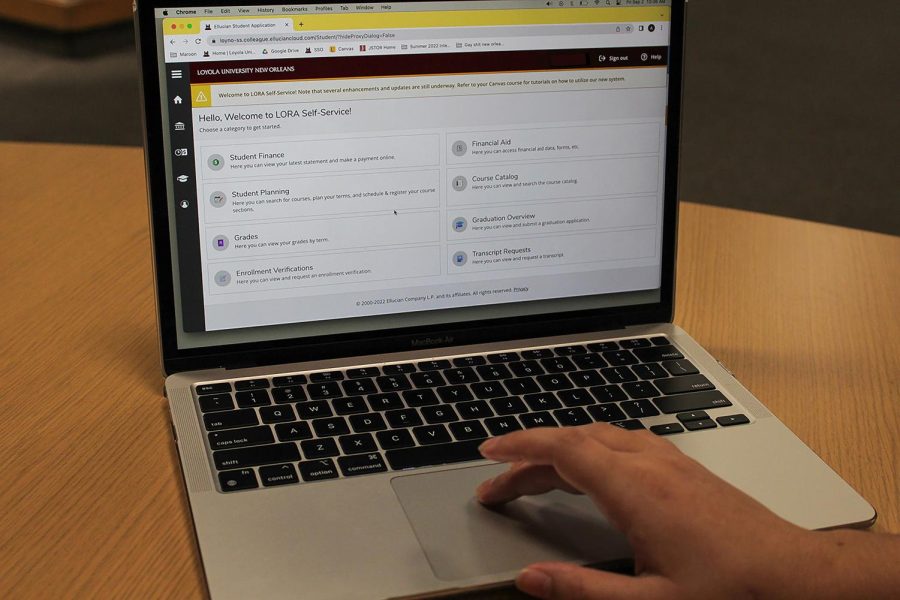Loyola stumbles through new-LORA implementation, looks toward new features
Photo illustration depicting a student logging into LORA self service.
September 10, 2022
Loyola University New Orleans undertook a costly, tedious, and labor-intensive project last year as it began to implement a new enterprise resource planning system and ultimately got rid of the university’s 40-year-old online records system, LORA.
The new-LORA, also known as LORA Self-Service or Project LUCI, is now familiar to students, as they registered for classes using this system at the end of last semester. The program itself is called Colleague, developed by the software company, Ellucian.
Now, administrators of the program have goals for its expansion, and students and administrators alike are looking forward to ironing out the bumps which managers of the system are expecting to come with its initial implementation.
Uriel Quesada, vice provost for institutional research, accreditation and academic engagement, argued that the implementation of the new LORA had students in mind above all else.
The university started the program’s implementation in the fall 2021 semester, and had a plan to implement the most significant parts of the system within 18 months. Quesada called Project LUCI an “ongoing” one.
“I think that it makes Loyola a better place for everyone,” he said. “I think that it is something critical.”
Nate Straight, the university’s director of institutional data analytics and reporting, added that there will be advancements coming to the program, including the possibility for students to hypothetically switch their major and plan their course load according to the potential switch.
He explained that this feature will replace uAchieve and be more advanced through investigating ‘what if’ options for students’ desires.
And for faculty and staff, the program will be more manageable as well, according to Straight. For example, when professors make exceptions for certain students to be placed into certain classes, they no longer need to make a phone call to another department or ask IT to do it. They will soon be capable of managing that on their own.
Quesada said that the Project LUCI efforts reflect the “spirit” of Loyola in working together to make it happen.
“Exceptional people have been involved in this project, doing a lot,” he said.
Why did they switch systems?
Quesada said that the main reason the university implemented a new planning system was to “adapt to the times.”
He added that the old LORA “was not enough to meet current needs and to serve staff, faculty and students the way that they should be served.”
The new system also better allows for members of the Loyola community to gain access to information, as well as input more of their own information, Quesada said.
For example, students can now manually input their names as well as pronouns in the system, addressing the grievances many transgender students shared in the past with the old LORA, according to Quesada.
With Colleague, everyone also has an easier way to update contact information, which he said is important in case of an emergency.
Straight helped to spearhead this project as well, and said that the implementation of it was essential.
Before the new enterprise resourcing planning system, the university’s database kept things separate, Straight said. In the past, systems for human resources, financial aid and course registration, for example, were separate and “living in wildly different places,” according to Straight.
Now, everything is on the same system, Straight said, and the final switchover to this framework happened this summer.
Additionally, Colleague is in the cloud, meaning that it doesn’t need local servers to function. The old LORA needed local servers in order to run and would often glitch and kick users out of the interface due to connection issues.
“I can literally do anything at all with the system here on my phone wherever I am,” Straight said, calling it a major benefit of the new LORA.
He added that though there is an initial learning curve with the system, there was little to no documentation in the past on how to operate the old LORA. With Colleague, there are tools that will teach faculty, staff and students how to work the system, he said.
Straight said that the old LORA was kept up and managed by the university’s IT department. While the department has had a separate software development wing for years, Straight argued that fixing the university’s systems through continual coding and streamlining of software is not the goal of the IT department, as they are needing to instead upkeep technology on campus.
And the fixes the IT department has done for years will now be completed by the vendor of the new LORA, the company, Ellucian, Straight said.
He seconded Quesada to say that implementing the new system is a part of keeping up with the times. He added that having an old enterprise system wasn’t attractive to students, especially prospective ones.
“We wouldn’t offer the same programs we offered in 1979, in the same way the systems that you interact (with) will need to keep pace with the changing times and reflect what today’s students actually do,” Straight said.
But Straight added that he doesn’t want or need the new LORA to be flashy or spectacular. He said that he and his team hope that the system becomes “something that fades into the background” as students use it.
“Really, the hope is that it feels as natural as using any app on your phone or computer,” he said.
How did the implementation happen?
Quesada said that the project has had multiple different teams from the beginning of its implementation which analyze the project. 150 to 200 staff and faculty have been working on Project LUCI in about a dozen different work teams with about 15 people each, Straight said.
One of the critical deadlines those managing the project had in place was to allow Fall 2022 students to register using the new system, according to Straight.
And though the goal was accomplished, it was difficult to do, Quesada said. In order to make it happen, the system needed a lot of work, he said. Each individual course needed to be submitted, and everything had to be tested, according to Quesada. Additionally, he said that all of the implementation struggles needed to be invisible for students as the users in order for them to have the “best possible experience.”
Straight claimed that most of the bumps he and his teams suspect are to come from needing to implement information that was built up in the old system that the university had had since 1979.
“There’s always ongoing configuration and maintenance,” he said. “We’ve relied on processes that we’ve had in place for some cases 40 years. We’re expecting bumps.”
Straight said that the university has spent millions of dollars on the implementation of the new LORA, though Quesada specified that the funding doesn’t come out of an operational budget but rather out of a special one for projects such as this.
The university’s financial leadership wasn’t immediately available to answer questions regarding the exact cost of the project.
How are members of the community adjusting?
Ivan Plokhikh, music industry studies junior, said that he had a problem with the new LORA because of its perceived effect on the waitlisting system for classes.
He was waitlisted for a class that he wanted to take at the beginning of the semester and said he was emailed to tell him he got in, but that the system was automatically dropping him from the program since he already had a class scheduled at that time.
Quesada said that Colleague allows for students to go on to the waitlist in the same way as before in the old LORA. But if there is an issue with scheduling, a student is passed over and the seat goes to the next person. He did not answer whether or not this is a recently added feature due to the newly implemented system.
Plokhikh argued that he would have gladly dropped the class he was initially enrolled in to get into the class he wanted to take. He added that the system’s possible effects on waitlisting wasn’t his only grievance. He said that he preferred the way the schedule was presented on the old LORA.
“Now, it feels a lot less organized,” he said.
Lily Broussard, a history sophomore, said they were frustrated with the new LORA because of the delay in their scholarships being put into the new system. A trip to the financial aid office helped them aid the issue, but Broussard said that they remained frustrated with the program, calling it “difficult to navigate.”
“The old system, I could just click on exactly what I wanted,” they said. “But the new system, it’s like you have to go through three or four different menus just to be where you want to be.”
Broussard commented on registration with the new system and said that it is definitely preferable to the old LORA, though they argued that implementing registration at the end of last semester was awkward timing.
“I feel like with anything new there’s always going to be a curve, but I feel like they could have done it at a better time,” Broussard said.
Broussard added that, despite their initial issues with the system, they are especially grateful that as a transgender person they are now able to input indentifying informatioin about themselves in the new system, which wasn’t as accessible in the old LORA.
“I appreciate that now they are adding that in because it gives students the opportunity to be a lot more comfortable on campus and not constantly correcting people,” they said.
Straight said that his team kept students in mind the entire way throughout this project and hopes that members of the community will reach out to them to hear what the team could be doing better.
“We want to hear about the things that are impacting your ability to do something,” he said.









